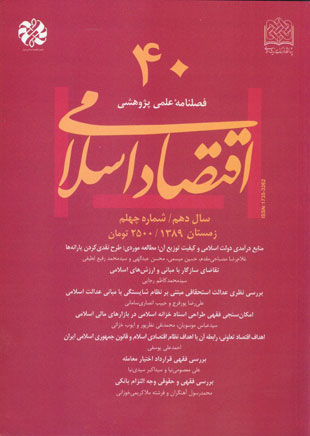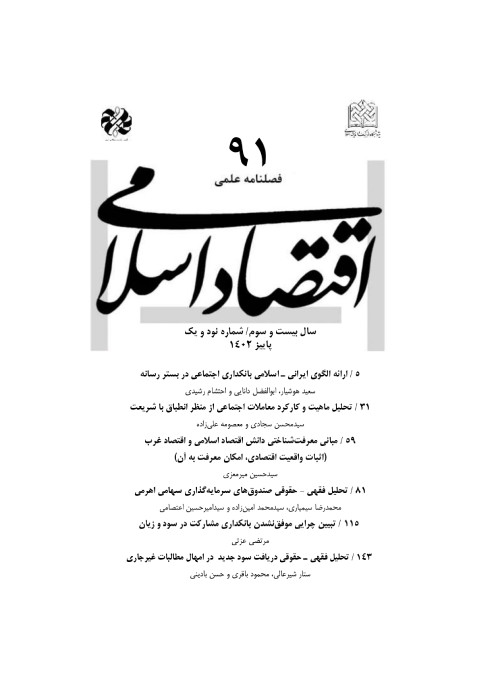فهرست مطالب

فصلنامه اقتصاد اسلامی
پیاپی 40 (زمستان 1389)
- 228 صفحه، بهای روی جلد: 25,000ريال
- تاریخ انتشار: 1389/11/15
- تعداد عناوین: 8
-
-
صفحه 145
-
صفحه 179
-
صفحه 211
-
Page 5Using a comprehensive approach, this paper tries to shed light on all financing sources of an Islamic government. We examine the Islamic jurisprudential and historical texts and discuss the ownership and consumption of each one of the sources separately. In addition, this research tries to extract different implications which could have its influence on precision in ownership and consumption of public fund's (bayt-ul-maal) resources in the plan of cash distribution of subsidies and classification of the receivers.The results, achieved through an analytical-descriptive method, show that all sources of income of an Islamic government can be divided into two categories: Imam's Fund (bayt-ul-maal-e-Imam) and Muslim's Fund (bayt-ul-maal-e-Muslimeen). The first one belongs to the leader of the state as a ruler's property and it can be distributed as and how he deems beneficial. The second one belongs to all Muslims and all have an equal right to it.The implications of this division for the subsidy plan and the classification of receivers is that, most of the financial sources of this plan are obtained from sales of petrol and other petroleum products. These products like oil are extracted from oil wells which are minerals and, according to the opinion popular amongst Islamic jurists; they are graded as 'anfaal' and belong to Imam's Fund (bayt-ul-maal-e-Imam). Therefore, from a juristic-historic view,the plan to distribute cash subsidies is free of any objections. Similarly the classification of receivers is also acceptable and the government, as a representative of the Islamic state, is not obliged to pay equal subsidies to all.Keywords: Plan of cash distribution of subsidies, classification, bayt, ul, maal, public fund, Islamic state, Islamic government
-
Page 29In the cognitive sources of capitalist economics, there is no place for Revelation and facts which cannot be experimented. Materialism is a basic principle in its philosophical foundations. The science of Economics is responsible to explore natural laws. Sensuous experimental cognition and logical analyses are enough in order to achieve reality. In this school man is a material being and a consumer is a person who is selfish, materialistic and is after maximization of utility meaning devotion to pleasure (hedonism). In Islamic economics, although the nearest source of achieving cognition is the senses, in order to understand the path of achieving bliss man's cognitive tools are needful of Divine guidance.Death is nothing but a transfer from this world to an eternal resting place.This world is just a cultivation land for the next one. Man under Islamic training and upbringing is an individual who is dynamic, responsible,strong and entrusted with Divine bounties.Learning about the ways of inspiring and persuading the faithful towards performance of good actions shows that the Holy Quran takes "durable pleasure and pain" for granted. It can be said that pleasure is also used in short-term instances but bliss (saadat), however, is only used for stable or relatively stable pleasures. A Muslim consumer is after stable pleasures (saadat). Theory of consumption will only be Islamic if it is compatible with the fundamentals of Islamic istemology, worldview and anthropology, the selection criterion is eternal pleasure and pain and limited resources are efficiently allocated paying due regard to positive and negative values in Islamic teachings and the rights of other people.This article, using a descriptive-analytic method, wants to prove this opinion that: Considering Islamic fundamentals and principles, demand of a consumer must be focused on necessary goods, must be confined within two limits of 'enough for sustenance' (hudd-e-kifaf) and extravagance (esraf),and must be less elastic.Keywords: Demand, pleasure, pain, bliss (sadat), utility, factors influencing demand, Islamic economics
-
Page 57Inequality, justice and economic growth are concepts which have always been under consideration by philosophers and economists. As absolute equality is not possible, in the same way absolute inequality of income is also not realizable. Islamic system believes in inequality based on merit. In these conditions every individual will earn income in accordance with his capabilities and merits and because levels of capability vary, people's income will also differ.This article, while taking into account Islamic principles, tries to theoretically present a model for evaluating inequality of income among people and its impact in each group with income over or under the average point (sustenance level), upon shift in levels of poverty and wealth. Its purpose is to introduce and evaluate, through this method, a just economic policy in order to establish economic justice and growth based on justice in an Islamic system.Keywords: Deserving justice – Islamic justice – Income inequality – Income distribution_Poverty_wealth
-
Page 87Treasury bills are one of the important and useful instruments used in financial markets. Although these instruments are distributed with the principle aim of making up government budget deficiencies, various other uses such as: being a medium of short term investments, a scale to gauge financial market's floor and most importantly,acting as an effective instrument for the Central Bank in execution of monetary policies; have given a special role [and status] to these instruments. Considering the prohibition of usury (interest) in Islam traditional treasury bills, because of their usury oriented nature, are not functional in an Islamic financial system. Thus an Islamic financial market's need towards having short term and low-risk financial instruments, which can substitute treasury bills in monetary and financial operations, is completely evident. The main question infocus in this article is that: referring to the teachings of Islamic jurisprudence is it possible to draft short term low-risk financial papers as Islamic treasury bills? Using a descriptive-analytic method of research, this article analyzes various types of Islamic treasury bills from the aspect of their compatibility with religious principles. In the end we demonstrate that in cases where government dues towards banks, companies and public or private institutes, belong to actual purchases of goods and services such as supply or construction contracts, buying and selling of such bills according to most of the Islamic sects, including Shiitejurisprudence and Iranian laws, is permissible. Therefore, based on such dues,short term financial bills with low risks can be offered as Islamic treasury bills.Keywords: Financial markets, treasury bills, Islamic treasury bills, financial policies, monetary policies
-
Page 117In the constitution of the Islamic Republic of Iran, economics of the cooperative sector has been introduced as one of the three sectors of Iran economics. Some instances have also been introduced as its goals in the law of cooperation.However the basis of pointing them out as goals is not known. It is a fact that goals determine the desired target and the path on which activities must take place. It is only through determination of goal that needs, resources and methods of reaching it can be specified, otherwise reaching the goals would be a difficult task and will be faced with numerous mistakes.In this article, using a descriptive-analytic method, first goals of an Islamic economic system have been mentioned. Subsequently a model of Cooperative economics acceptable to all intellectual schools of cooperatives and after slight corrections is also endorsed by Islamic teachings, is explained. Afterwards it identifies the goals of cooperative participators, cooperative economic sector and government in this model and it demonstrates that establishment of this cooperative economic model is a favorable ground to achieve the goals of Islamic economic system. In the end, keeping in view the results of this research, deficiencies of cooperative economics in the laws of the Islamic Republic of Iran are brought to light and are revised in accordance with the results of this research.Keywords: Cooperative Economics, goals of cooperative participators (cooperators), goals of cooperative sector economics, government's goals in cooperative economics, goals of the Islamic economic system, law of cooperative's of the Islamic Republic of Iran
-
Page 145Being one of the derivative instruments, 'option's hold a great importance and are widely in use in the financial markets. Therefore a jurisprudential study of these instruments and contracts is a necessity. The present article takes a new look at the jurisprudential and legal discussion of such transactions. It analyzes the transactions of 'Sales of Right' and 'Exchange of Promise's as correctsolutions for prevailing option contracts and ways of 'Agency', 'Conditional Gift' and 'Waiver of Right' as alternative solutions. Sales transaction consists of some objections. Though finding an instance for right of fulfillment of need,based on some principles is acceptable, and validation of the transaction in framework of paying money against promise can be justified by relying upon the general arguments of contracts, and agency and conditional gift can be suggested as alternative solutions, but it is not close to the environment of derivative market. In the end payment of money against waiver of right has been presented as the third alternative solution, free of any objections. "Gharar",in this article, has been considered as the most important objection on 'option contracts'. Transactions in the secondary market have been shown as valid.Method adopted by the article to study the subject is descriptive-analytic based upon ocumentary evidence. Main feature of the accepted solutions is that they agree with the popular principles of Islamic jurists and are executable in financial markets.Keywords: Options, risk, sales of right, agency, conditional gift, waiver of right, period of formulation of religious law (tashree'), primary market, secondary market
-
Page 179One of the problems of banking system is delayed repayments of loans by the customers. Stipulation of a non-performance penalty/performance pledge or delayed payment penalty in banking contracts is one of the ways to solve this problem. Because of differences about legitimacy of this approach amongst Islamic jurists, it is necessary that jurisprudential views on this issue be analyzed along with proper explanation of nature of the penalty clause/performance pledge.Using an analytical and descriptive method and based on juridical sources this article intends to prove the following hypothesis: Nonperformance penalty/performance pledge or delayed payment penalty is punitive in nature and is different from late payment damages, which has a compensatory nature. Regardless of similarity with usury, this approach has other juridical and legal problems which can make using it as a solution for problem of delayed repayment, objectionable. Proving such a hypothesis, in addition to providing the correct definition of nonperformance penalty, is also effective in identifying and explaining its religious rule.Keywords: Non, performance penalty, delayed payment penalty, late payment damages, financial tazir


